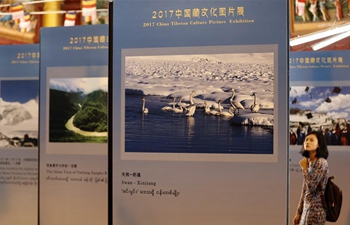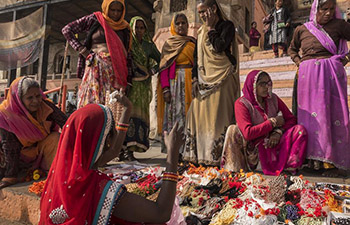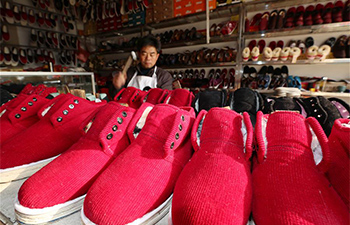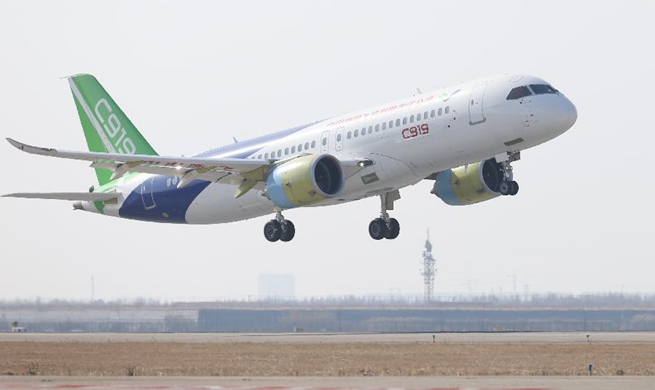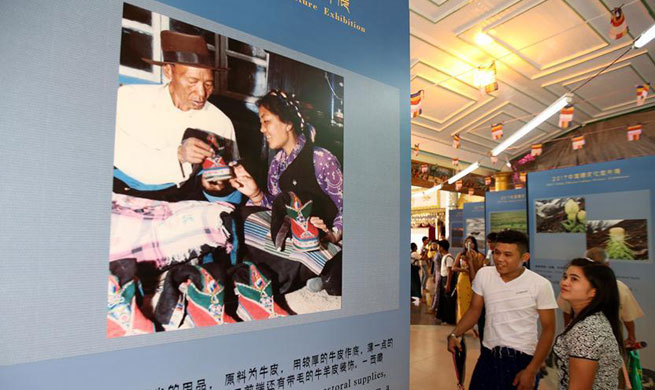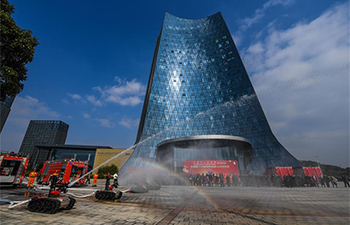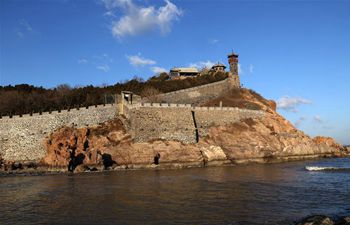by Xinhua writer Liang Junqian
BEIJING, Dec. 18 (Xinhua) -- As 2017 moves further into the rearview mirror, it leaves a mixed message. The year has seen both hope and fear in an increasingly complex and interdependent world and the call is for all countries to joins hands and shoulder their due responsibility.
A DIVIDED WORLD
It's been a year of tumult that brought a flurry of changes marking a divided world. Some countries retreated into nationalism, protectionism or unilateralism. Globalization faced political headwinds while instability and uncertainty prevailed.
In the international arena, the United States pulled up the drawbridge in the name of protecting national interests. Since he assumed office in January, President Donald Trump has abandoned or threatened to quit several international accords under his "America First" policy. Washington withdrew from the Paris Agreement on climate change, pulled out of the United Nations (UN)'s culture and education body UNESCO, and ended its participation in the Global Compact on Migration, dismaying even close allies.
Domestically, the Trump Administration came under fire for the continued racial and ethnic tensions that started erupting since his predecessor Barack Obama's tenure. In August, a UN committee to tackle racism issued "an early warning" over the conditions in the United States, prompting The Guardian daily to comment that after the warning, "America's self-image begins to crack."
In 2017, a spate of elections across Europe -- in the Netherlands, France, Germany and Austria -- added to the turmoil. With German Chancellor Angela Merkel failing to form a majority government and voicing her preference for reelections, she may face a tougher battle if reelections are held.
Also, following British Prime Minister Theresa May's plodding ahead with Brexit talks, there is now widespread fear that the trail blazed by Brexiters will trigger more euroscepticism and europhobia. Analysts have said that Britain exiting the European Union (EU) poses a systematic challenge to the future of European integrity.
There are more rifts elsewhere. The Russia-U.S. tit-for-tat tussle has escalated, leading to new sanctions and diplomatic expulsions. The U.S. decision to recognize Jerusalem as Israel's capital has seen a volley of global condemnation and protests.
In the turbulent Middle East, after the violence in Syria and Yemen, now oil-rich Qatar has been isolated by its powerful Arab neighbors over its alleged support for terrorism.
"All these problems should be addressed by regional cooperation, multilateral mechanisms and globalization," Ruan Zongze, executive vice president of China Institute of International Studies, the think tank of the Chinese Ministry of Foreign Affairs, has told Xinhua.
CHANNELS FOR WIN-WIN COOPERATION
Experts are calling for channels of communication and multilateral cooperation to avoid misunderstandings that could worsen into conflicts.
"Creating a shared future in a fractured world requires addressing issues on the global agenda in a holistic, interconnected and future-oriented way," Klaus Schwab, founder and executive chairman of the World Economic Forum, recently said in Geneva.
Several multilateral organizations are doing that. At the G20 Summit in Hamburg in July, the bloc's leaders agreed to support free trade, globalization and open markets, and oppose protectionism. This is a continuation of the legacy of the 2016 summit in Hangzhou, China, which emphasized innovation, vitality, interconnectivity and inclusiveness.
The Ninth BRICS Summit in Xiamen, China, in September also underscored the commitment of the emerging market group to boosting global economic growth by strengthening cooperation both within the bloc as well as with other developing countries.
China's proposals like "BRICS Plus" and the Belt and Road Initiative have created new impetus for an open economy and multilateral trade that benefits the world as a whole, according to Stephen Orlins, president of the National Committee on U.S.-China Relations.
"BRICS Plus" proposes expanding the membership of the five-member grouping, while the Belt and Road Initiative, put forward by Chinese President Xi Jinping in 2013, envisions enhancing infrastructure, trade and people-to-people links to better connect Asia, Europe and Africa.
The Belt and Road Forum for International Cooperation hosted in Beijing in May saw a clutch of multilateral agreements in five key areas -- policy, infrastructure, trade, financial and people-to-people connectivity -- which concretized Xi's vision, ensuring win-win outcomes for all the actors involved.
"China is an inspiring example for many countries. Its success and historical experience make it possible to provide the world with a solution based on win-win cooperation," said Andrei Vinogradov, chief of the Center for Political Study and Forecast of Far East Studies Institute of the Russian Academy of Sciences.
SILVER LININGS FOR A COMMON FUTURE
Despite the drawbacks, 2017 has seen some silver linings as well, thanks to the joint efforts of the international community.
The Islamic State (IS) terror group which unleashed violence and barbarity in several countries already undergoing unrest faces defeat in Iraq and Syria, with its organizational capacity crushed. As its remaining territory shrinks, Syria, where IS escalated a crisis already triggered by a civil war, a new phase seems on the cards.
A new round of Russia-led international negotiations on the Syrian conflict will be held in Astana, Kazakhstan, on Dec. 21. It is hoped that this fresh approach will yield more concrete results as eight rounds of peace talks held in Geneva under the UN aegis have not seen the intended results.
This year also witnessed a serious start to reconciliation to end more than a decade of internecine strife in Palestine where Hamas, which rules Gaza, warred with its rival Fatah that largely controls the West Bank, after a consensus government took over in October.
There are also glimmers of hope for the global economy, a major reason for the global turbulence, after a protracted slump worldwide. The International Monetary Fund raised its global growth forecast for 2017 and 2018 after a broad-based recovery in Europe, China, Japan and the United States. The upswing offers a window of opportunity to undertake critical reforms, the organization said.
As Xi said in his report at the 19th National Congress of the Communist party of China in Beijing in October, "No country can address alone the many challenges facing mankind; no country can afford to retreat into self-isolation."
So as the old year gives way to the new, unity and cooperation remain the need of the day in an era of increasing interconnectedness and interdependence. (Xinhua reporters Xie Lin, Xie Binbin, Feng Jian also contributed to the story.)





